Lame Duck Congresses And The Constitution
While not inherently unconstitutional, lame duck Congresses have the potential for violating the spirit of the Constitution and create the potential for mischief on the part of Representatives who have been thrown out of office.
For the first one hundred forty-four years of the American history, the Constitution contained what some might have considered an opportunity for Executive and Legislative mischief. While elections for Congress and the President were held in November, new members did not take office until March 4th of the following year, thus creating a 17 week lame duck period when politicians who had lost their re-election bids were still in office. For much of the century and a half that this was the case, it wasn’t uncommon for Congress to be in session, and enacting legislation, despite the fact that the people had spoken only weeks before. Additionally, though, there were times of great political or economic crisis, such as after the Elections of 1860 and 1932, when sitting representatives and Presidents did essentially nothing to respond to the chaos around them while newly elected members sat on the sidelines, powerless to do anything.
At the time, of course, the delay between the election and the beginning of a new Congress or Presidency was due to the realities of transportation. Even a trip from Thomas Jefferson’s Monticello to Philadelphia was a multi-day effort that could become even more difficult depending on the time of year and the weather. By 1932, though, that reality had changed and travel to Washington from various parts of the country was far faster than it had been a century before. Because of that, and in response to complaints from many about the fact that the 17 week lame duck period was being used to pass legislation at odds with the will of the public, the 20th Amendment was added to the Constitution, which provides in it’s first section that:
The terms of the President and Vice President shall end at noon on the 20th day of January, and the terms of Senators and Representatives at noon on the 3d day of January, of the years in which such terms would have ended if this article had not been ratified; and the terms of their successors shall then begin.
The seventeen week lame duck period was shortened to seven weeks, but as Bruce Ackerman notes in The Washington Post, that was the result of a compromise that could have ended lame duck sessions entirely:
Then-House Speaker Nicholas Longworth (R-Ohio) favored a direct approach. His proposal, passed by the House, would have imposed a cutoff date on the congressional session, ending it before the November elections, and making lame-duck meetings a legal impossibility. But Nebraska Sen. George Norris, who had spearheaded the amendment campaign, was skeptical: Once senators knew that Congress had to leave town by a fixed date, they would launch last-minute filibusters to force their special-interest riders onto “must-pass” legislation.
Norris’s realistic view carried the day. The final draft didn’t specify a pre-election cutoff date but gave Congress a brief post-election existence. It required Congress to expire on Jan. 3, providing it with a seven-week lease on life. This was in sharp contrast with the 17 post-election weeks that had been available for lame-duck activity.
This cutback was decisive, according to such sponsors as Rep. Emanuel Celler (D-N.Y.). He thought it “inconceivable” that lame ducks would return to Washington for seven weeks. Given the Thanksgiving and Christmas holidays, as well as the era’s railroad timetables, Celler’s claim was never seriously challenged. Norris gave the same assurance to the Senate and the public at large.
The Chicago Tribune explained that “the defeated legislator has only about seven weeks to hold onto his job and except in extraordinary cases Congress will not be in session during this time.”
Norris’s view was probably the correct one. The idea that there would essentially be no Congress from November to January 3rd strikes me as far too risky an idea, even though the number of times that Congress has had to be called into emergency session in American history have been, thankfully, minimal. As Ackerman notes, however, the original intent of the 20th Amendment has been ignored in recent years as the lame duck period has become a time for Congress to consider controversial, even unpopular, legislation after having been voted out of office:
After 1954, there was a 16-year interlude in which lame-duck sessions were unknown, but they reemerged on four occasions during the 22 years between 1970 and 1992 – without any emergency justification. Since 1994, lame-duck meetings have become routine. With a single exception, every Congress has returned after the election.
They have been making very big decisions: passing NAFTA in 1994, impeaching President Clinton in 1998 and creating the Department of Homeland Security in 2002. These large initiatives serve as precedents for the coming lame-duck consideration of such weighty matters as permanent tax relief and the New START arms treaty with Russia.
Ackerman’s critique strikes me as being largely correct. In addition to tax cuts and an arms treaty, ideas which do indeed have merit regardless of when they’re being considered, there have also been indications that the recently rejected Democratic majority in the House also intends to use the lame duck session that starts tomorrow to take up controversial pieces of legislation such as the so-called DREAM Act, which deals with immigration, as well as threatened votes on Cap & Trade and “card check” labor bills that have languished since Congress was gaveled into session in 2009. In addition to all of that, Congress must still pass budgets for all of the Executive Branch departments, including a DoD budget that his hobbled down over a the repeal of Don’t Ask, Don’t Tell. And, oh yeah, they’ve also got two ethics trials — one for Charlie Rangel and one for Maxine Waters — to deal with. More than anything else, the reason we have to have a lame duck session this year, is that Congress didn’t bother to do its job on important issues like the budget and the extensions of the Bush tax cuts before the elections.
Now, it’s quite probable that much of what comes out of the House over the next few weeks will die in the Senate so the fears that some on the right have are, as I said a few months ago, incredibly overblown:
[The] nightmare scenario seems to completely forget that the United States Senate exists and that the Republican Party has enough votes to prevent any measure from getting to a floor vote if it stays united. Assuming big Republican success on November 2nd, it seems hard to believe that unity would crumble in the face of Democratic attempts to pass legislation that would clearly not make it through the 112th Congress when it convenes in January.
There’s no reason to believe that won’t be the case.
Nonetheless, Ackerman is right to raise concerns about the abuse of the lame duck period that have developed over the past decade. The ability of representatives, many of whom have been voted out of office, to speak on legislation strikes me as being somewhat anti-democratic to say the least, and creates a tremendous temptation for abuse. Outside of amending the Constitution again, though, I’m not sure how we can stop it from happening except by appealing to the better natures of our Representatives demanding that Congress stop abusing its power.
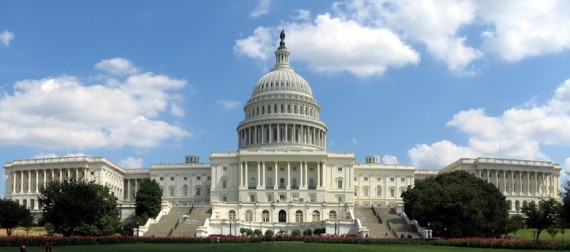

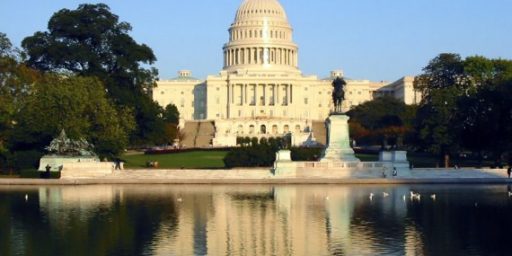
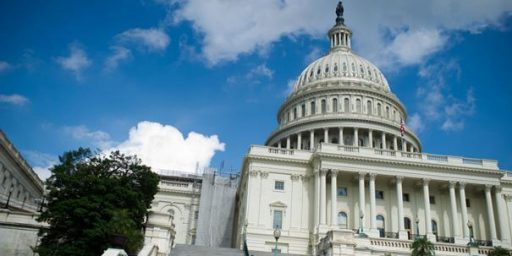
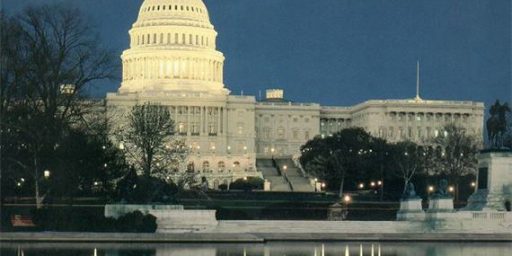

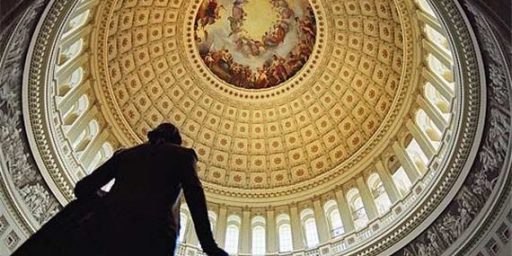
American Constitution Published in Full Text, Film At 11.
Just keep voting out the abusers.
The lame duck period was even longer than 17 weeks in some states like Maine that held their Congressional elections in September. Requiring a uniform federal election day began in 1872, but I think some of the Northern states were grandfathered.
I suppose it is inevitable – given any particular legal or constitutional distribution of power, there will be an incessant move by all players involved to fully exploit whatever advantage can possibly be unearthed under those rules.
We see that with the filibuster for example – what began as a gentleman’s agreement that the Senate would not move to a vote until everyone agreed that the issue had been sufficiently discussed, eventually became a lever by which any one Senator could dictate whether a bill would be voted on at all. Thus there arose the need to find a mechanism to end debate even over the objection of 1/3 of the Senate. Then when that was abused, it was shifted to 2/5 of the Senate. Eventually it will have to be done away with, since it is no longer ever used for its actual intended purpose – to insure full debate, and then move on to a majority vote.
The Republican effort to impeach a sitting president when the great majority of the country supported no more than a formal rebuke, and after the President’s party had made surprising gains in the midterms – probably put the final nail in the coffin of any concern about lame-ducks violating the will of the people. That train has left the station. Either amend the Constitution to forbid an old Congress from meeting after Election day, or just live with the current arrangement. You are not going to convince anyone to simply voluntarily decline to exercise powers that they have, and that the other side has routinely used.
Perhaps a constitutional amendment, or short of that, a House rule could be instituted whereby the bar to pass legislation out of the House after a lame duck to be a 2/3rds majority, not a simple majority.
I don’t think such a measure is as needed in the Senate given the utility of the filibuster and of holds, and the nature of the Senate as a body that maintains 2/3rds continuity between Congresses, seeing only 1/3rd of its membership up for election at any given time.
“Perhaps a constitutional amendment, or short of that, a House rule could be instituted whereby the bar to pass legislation out of the House after a lame duck to be a 2/3rds majority, not a simple majority.
I don’t think such a measure is as needed in the Senate given the utility of the filibuster and of holds”
Then why have the House rule as the Senate can act as a check on anything coming out the House (how many bills in the 111th Congress died in the Senate? I’ve read upwards of 400.), as was indicated in Doug’s post?